China Box Office: ‘Stand By Me’ Wins Muddled-up Mid-Autumn Holiday Weekend


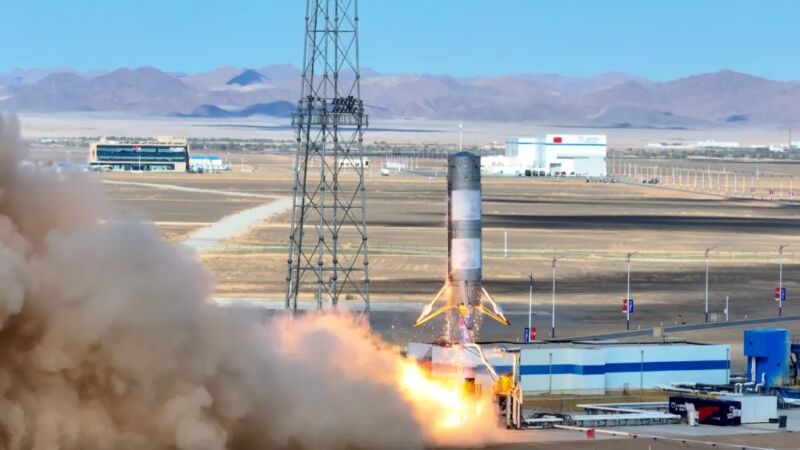
Enlarge / Landspace's reusable rocket test vehicle lifts off from the Jiuquan Satellite Launch Center on Wednesday, September 11, 2024. (credit: Landspace)
Welcome to Edition 7.11 of the Rocket Report! Outside of companies owned by American billionaires, the most imminent advancements in reusable rockets are coming from China's quasi-commercial launch industry. This industry is no longer nascent. After initially relying on solid-fueled rocket motors apparently derived from Chinese military missiles, China's privately funded launch firms are testing larger launchers, with varying degrees of success, and now performing hop tests reminiscent of SpaceX's Grasshopper and F9R Dev1 programs more than a decade ago.
As always, we welcome reader submissions. If you don't want to miss an issue, please subscribe using the box below (the form will not appear on AMP-enabled versions of the site). Each report will include information on small-, medium-, and heavy-lift rockets as well as a quick look ahead at the next three launches on the calendar.

Landspace hops closer to a reusable rocket. Chinese private space startup Landspace has completed a 10-kilometer (33,000-foot) vertical takeoff and vertical landing test on its Zhuque-3 (ZQ-3) reusable rocket testbed, including a mid-flight engine reignition at near supersonic conditions, Aviation Week & Space Technology reports. The 18.3-meter (60-foot) vehicle took off from the Jiuquan launch base in northwestern China, ascended to 10,002 meters, and then made a vertical descent and achieved an on-target propulsive landing 3.2 kilometers (2 miles) from the launch pad. Notably, the rocket's methane-fueled variable-thrust engine intentionally shutdown in flight, then reignited for descent, as engines would operate on future full-scale booster flybacks. The test booster used grid fins and cold gas thrusters to control itself when its main engine was dormant, according to Landspace.

Enlarge (credit: eugenekeebler via Getty Images)
In an age when you can get just about anything online, it's probably no surprise that you can buy a diamond-making machine for $200,000 on Chinese eCommerce site Alibaba. If, like me, you haven't been paying attention to the diamond industry, it turns out that the availability of these machines reflects an ongoing trend toward democratizing diamond production—a process that began decades ago and continues to evolve.
The history of lab-grown diamonds dates back at least half a century. According to Harvard graduate student Javid Lakha, writing in a comprehensive piece on lab-grown diamonds published in Works in Progress last month, the first successful synthesis of diamonds in a laboratory setting occurred in the 1950s. Lakha recounts how Howard Tracy Hall, a chemist at General Electric, created the first lab-grown diamonds using a high-pressure, high-temperature (HPHT) process that mimicked the conditions under which diamonds form in nature.
Since then, diamond-making technology has advanced significantly. Today, there are two primary methods for creating lab-grown diamonds: the HPHT process and chemical vapor deposition (CVD). Both types of machines are now listed on Alibaba, with prices starting at around $200,000, as pointed out in a Hacker News comment by engineer John Nagle (who goes by "Animats" on Hacker News). A CVD machine we found is more pricey, at around $450,000.



Enlarge / A "selfie" photo of China's Zhurong rover and the Tianwen-1 landing platform on Mars in 2021. (credit: China National Space Administration)
China plans to launch two heavy-lift Long March 5 rockets with elements of the Tianwen-3 Mars sample return mission in 2028, the mission's chief designer said Thursday.
In a presentation at a Chinese space exploration conference, the chief designer of China's robotic Mars sample return project described the mission's high-level design and outlined how the mission will collect samples from the Martian surface. Reports from the talk published on Chinese social media and by state-run news agencies were short on technical details and did not discuss any of the preparations for the mission.
Public pronouncements by Chinese officials on future space missions typically come true, but China is embarking on challenging efforts to explore the Moon and Mars. China aims to land astronauts on the lunar surface by 2030 in a step toward eventually building a Moon base called the International Lunar Research Station.




Enlarge / Gen. Stephen Whiting, commander of US Space Command, speaks earlier this year at Peterson Space Force Base, Colorado. (credit: USSPACECOM photo by John Philip Wagner Jr.)
The head of US Space Command said Wednesday he would like to see more transparency from the Chinese government on space debris, especially as one of China's newer rockets has shown a propensity for breaking apart and littering low-Earth orbit with hundreds of pieces of space junk.
Gen. Stephen Whiting, commander of US Space Command, said he has observed some improvement in the dialogue between US and Chinese military officials this year. But the disintegration of the upper stage from a Long March 6A rocket earlier this month showed China could do more to prevent the creation of space debris and communicate openly about it when it happens.
The Chinese government acknowledged the breakup of the Long March 6A rocket's upper stage in a statement by its Ministry of Foreign Affairs on August 14, more than a week after the rocket's launch August 6 with the first batch of 18 Internet satellites for a megaconstellation of thousands of spacecraft analogous to SpaceX's Starlink network.
The story was produced in partnership with Important Context.
Last summer, Ava Chen appeared on the right-wing news outlet Real America’s Voice to rail against the RICO charges that had just been filed against Donald Trump and 18 co-defendants in Georgia. The indictment “reminds me a lot of China and the CCP,” Chen told host John Fredericks, a former Trump campaign aide who now anchors one of the fledgling TV network’s marquee shows.
Chen was identified during the August 2023 segment as a spokesperson for the New Federal State of China, a MAGA-aligned group founded by Steve Bannon and Guo Wengui—a dissident Chinese émigré who last month was convicted on RICO and fraud charges for stealing hundreds of millions of dollars from his own followers. Prosecutors named the NFSC as part of Guo’s fraud scheme, arguing that the group’s ostensible opposition to the Chinese Communist Party was part of Guo’s scam.
In recent years, members of the NFSC have made frequent appearances across Real America’s Voice, as well as on Fredericks’ radio show. But what viewers didn’t know was that at the time of these interviews, a firm tied to the NFSC was paying tens of thousands of dollars to have Guo’s representatives appear on Fredericks’ radio and TV shows, as well as on another show that aired on RAV. The firm was also attempting to purchase airtime for the NFSC elsewhere on the network.
These payments for appearances on Fredericks’ shows are detailed in a draft contract, court records, and bank statements reviewed by Mother Jones and Important Context. They were also described by three sources. Bank records show the payments went to Common Sense Media, a company tied to Fredericks’ radio show, which is independently produced and selects its own guests. Records we reviewed and the same sources indicated that Guo’s supporters also discussed a contract that would have allowed his followers to secure airtime elsewhere on RAV, but those talks fell through.
The transactions involving the Fredericks broadcasts were one piece of a well-financed effort by Guo backers to push messaging supporting Guo. As part of their broader outreach campaign, Guo followers also arranged extravagantly pro-Guo op-eds written under the bylines of prominent far-right figures, including New York Young Republican Club chief Gavin Wax and Karoline Leavitt, who has since become a spokesperson for the Trump campaign. Guo supporters reportedly paid $75,000 for two booths at the influential Conservative Political Action Conference, and they showered campaign contributions on members of Congress who expressed sympathy for Guo’s cause. In their outreach to the MAGA world, Guo followers argued that, just like Trump, Guo was the victim of a politicized prosecution.
“This is the fourth indictment [against Trump] in the short span of four and a half months,” Chen said during her August 21, 2023, interview on the Fredericks show on RAV. “And this speaks a lot to the rule of law and to the weaponization of the entire justice system, as we have observed in…Guo’s case.”
Such arguments have received support from Bannon on his War Room broadcast, which is among the most popular shows aired by RAV. A company that federal prosecutors have said Guo controlled made large monthly payments to the Bannon-controlled company that produces War Room. These payments totaled at least $270,000, according to a filing in federal bankruptcy proceedings initiated by Guo. Guo has also paid Bannon millions of dollars since 2017, court documents show. And Bannon has enthusiastically repeated claims made by Guo about Guo’s business ventures and political movement.
But in arranging to appear on RAV shows, the Guo backers appear to have tapped more deeply than was previously known into the growing and unruly ecosystem of far-right broadcasts. RAV is owned by Colorado media mogul Robert Sigg, whose previous success came through WeatherNation, an alternative to the Weather Channel that reportedly made a point of not mentioning climate change. RAV, which began broadcasting in 2018 as America’s Voice News, started distributing War Room shortly after the show’s 2019 launch. Bannon has credited Sigg with helping the show after Bannon was kicked off YouTube in the aftermath of the January 6 insurrection.
With War Room as its anchor, RAV also broadcasts shows hosted by other MAGA celebrities, including Charlie Kirk, Eric Greitens, and John Solomon—a lineup that has allowed the upstart outlet to position itself as a competitor to Fox News, Newsmax, and OAN. Fredericks, a conservative radio veteran, hosts Outside the Beltway on RAV. Grant Stinchfield, whose show regularly features Guo backers, also broadcasts on the network. RAV has said it reaches viewers through “DISH, Pluto TV, Roku, Amazon Fire, Apple TV, Google Play,” and social media. Some of the shows RAV distributes, including Fredericks’ and Bannon’s broadcasts, are produced independently. Other RAV shows are produced in-house.
In interviews, four people familiar with booking practices for shows that have run on RAV said that they considered it unexceptional for guests to pay to appear on broadcasts, without any disclosure on the air that they have paid to appear. Usually these guests pay a booker or PR firm, which makes payments to the shows, the sources we spoke to said. The sources said they believed these types of arrangements are not limited to right-leaning media, though these people had limited experience with mainstream and left-leaning media.
“All channels do this,” said one person familiar with NFSC arrangements. “This happens all day long. You can call it ‘pay to play’ but this is not unusual.”
However common such arrangements may be, they are not transparent to RAV’s viewers. Neither Fredericks nor his NFSC guests made any reference in the segments we reviewed to the group paying to appear on this show.
The payments made by the New Federal State of China followers became public in part because of a bitter legal and public relations fight among former colleagues at a Georgia-based firm called L-Strategies. The firm acted as an intermediary, accepting payments from a Guo-linked company and, in turn, making payments for Guo followers to appear on Fredericks’ shows. A federal lawsuit filed by executives at L-Strategies against Angie Wong, a former partner there, alleges that Wong’s actions caused them “a loss of potential income [of] $120,000 per year” that they had hoped to earn brokering airtime for NFSC content on RAV.
Jared Craig, a partner at L-Strategies who filed the complaint, said in an interview last year that he did not believe that paying broadcasters to interview clients as guests was unusual. Craig declined to detail the specifics of the payments, which he said were arranged by Wong, and he did not respond to more recent inquiries. Wong declined to comment.
According to that lawsuit, a Canada-based company called NewNoah signed a deal with L-Strategies in April 2023. NewNoah, which was acting on behalf of the New Federal State of China, was incorporated in November 2022 in Ontario at an address also used to register the NFSC’s website.
Under a draft media-buy agreement between NewNoah and L-Strategies that we obtained, L-Strategies agreed to pay $12,500-a-month “for media appearances to be sponsored by the John Fredericks Media Network.” The draft contract stated that the media package would include “at least one (1) television media hit and at least one (1) radio hit per week” to promote its client, Guo’s New Federal State of China. The draft contract also noted that “said media services shall be sponsored by the John Frederick’s Media Network” and that “host shall not mention Miles Guo at any time and for any purpose during media hits.” (Miles Guo is one of several names Guo uses.)
The draft contract, which was unsigned and undated, contains some confusing and seemingly inaccurate language. But bank statements posted online as part of L-Strategies’ dispute with Wong reveal that NewNoah began making monthly payments of $13,400 to L-Strategies in April 2023. L-Strategies in turn began making $12,500 monthly payments to Common Sense Media, a Virginia-based LLC tied to Fredericks’ show. Fredericks’ wife, Anita Fredericks, is the registered agent for Common Sense Media. The monthly bank statements, which run through May 2024, show regular $12,500 payments from L-Strategies to Common Sense Media up to that time. The bank statements indicate Common Sense Media had received at least $175,000 as of May as part of the arrangement. (In an interview, Stan Fitzgerald, an L-Strategies founding partner, confirmed that the bank statements were accurate but said he had not personally posted them.)
On July 10, 2023, Fredericks’ radio show was guest-hosted by Nicole Tsai, a Guo supporter who had appeared on the program at least once a week up to that month as a representative of the NFSC. She appeared on his Real America’s Voice show nearly as frequently. When the New Federal State of China held a gala event last June celebrating the third anniversary of its founding, Fredericks was on hand hosting a panel. As of July 1, 2024, Fredericks had hosted a member of the NFSC on either his television or radio show nearly every week since April 3, 2023.
The NFSC guests used these appearances to attribute all manner of US problems to CCP machinations.
In an August 2023 segment on Fredericks’ Outside the Beltway RAV show, discussing Donald Trump’s arraignment in Georgia, a Guo follower named Roy Guo (no apparent relation) suggested the charges against the former president were the result of infiltration by the Chinese Communist Party. In an appearance the following month on the same program, he claimed Chinese President Xi Jingping was facing stiff political pressure at home because he had “released the CCP virus at the end of 2019,” triggering the Covid pandemic. A month later, following the deadly October 7 terror attack by Hamas on Israel, Roy Guo asserted that the CCP was secretly aiding Hamas behind the scenes in order to bring other nations into the conflict in Gaza.
“CCP wants to get as many countries as possible involved in this, and also eventually they want to get [the] UK and US involved in this conflict so that they can divert the attention to, like, focus on the Middle East and deplete US resources and also to alleviate pressure for Russia in Ukraine,” he said. “And then, they will ultimately make [an] opportunity for themselves to attack Taiwan.”
Mark Serrano, a spokesperson for RAV, disputed the import of the deal between NewNoah and L-Strategies related to payments to Common Sense Media for appearances on Fredericks’ show. “Real America’s Voice is not a party to the contractual agreement you mention,” he wrote. “Any ancillary reference in the agreement to us is not our concern.”
Fredericks has previously faced scrutiny for selling access to his radio show. In 2020, the Justice Department forced a US institute funded by the Qatari government to register under the Foreign Agents Registration Act, resulting in the organization revealing it had paid Fredericks’ show $180,000 in 2018 for “access to key guests”; “regular show appearances by highly ranking Qatar officials”; broadcasts of “live shows every other month” and “regular discussions with US based and overseas Qatar officials for background and education.” Fredericks also broadcast live from Doha, Qatar’s capital, in March 2018.
Fredericks at the time claimed the payments were standard advertising. He told the Daily Beast: “They were paying me to promote their various events, which I did in my libraries when I was on the show.”
John and Anita Fredericks and the John Fredericks Show did not respond to requests for comment or to lists of specific questions. Ava Chen and Roy Guo declined to comment.
According to the L-Strategies’ lawsuit, NewNoah also paid for Guo fans to appear on another independently produced show that briefly aired on RAV, the David Brody Show. And the L-Strategies bank statements posted online show a payment of about $8,000 to the Brody show in April 2023. Brody declined to comment.
NewNoah and L-Strategies also attempted to negotiate a separate, $40,000-per-month contract under which L-Strategies would purchase airtime on RAV for a weekly one-hour “show” hosted by the NFSC, according to the complaint L-Strategies filed.
“Real America’s Voice package includes a one-hour program (approximately 48 minutes run time) on the Real America’s Voice network once per week, time to be determined,” the contract, attached to the complaint, reads. “The show will be self-produced by NewNoah, with final edit approvals by Real America’s Voice prior to airing.”
According to the L-Strategies complaint and a source involved in the negotiations for the hour-long show, talks over that deal eventually broke down.
The L-Strategies complaint states that NewNoah did pay $40,000 to L-Strategies on April 28, 2023, and the bank statements posted online show L-Strategies received a $39,977.50 wire transfer, from an unidentified sender, on that date. In the “description” field, the statement says, “RAV 1 hour.” But the bank statements do not show any corresponding payment from L-Strategies to RAV. And Serrano, the RAV spokesperson, said that money was never paid to Real America’s Voice. Serrano did not respond to other questions about this proposed arrangement.
According to the RAV website, the outlet “demands the highest ethical standards from management and staff, and the company maintains a strict ethics policy.” The site notes that “staff members are prohibited from engaging in any conflicts of interest, including reporting on any enterprise in which the staff member has a financial stake.”
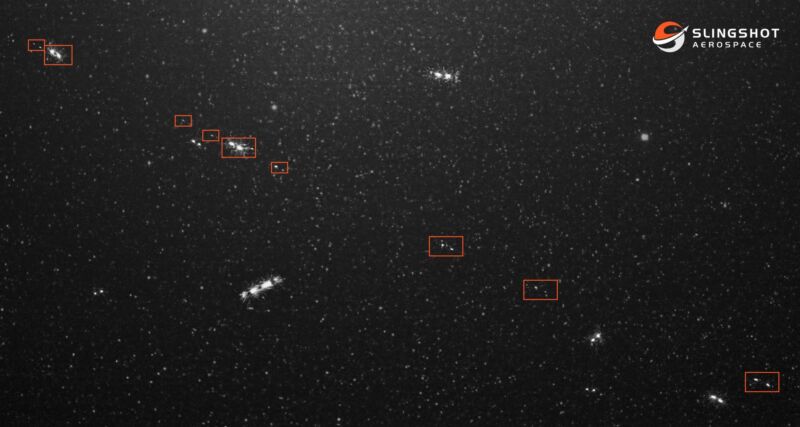
Enlarge / Debris from the upper stage of China's Long March 6A rocket captured from the ground by Slingshot Aerospace. (credit: Slingshot Aerospace)
The upper stage from a Chinese rocket that launched a batch of Internet satellites Tuesday has broken apart in space, creating a debris field of at least 700 objects in one of the most heavily-trafficked zones in low-Earth orbit.
US Space Command, which tracks objects in orbit with a network of radars and optical sensors, confirmed the rocket breakup Thursday. Space Command initially said the event created more than 300 pieces of trackable debris. The military's ground-based radars are capable of tracking objects larger than 10 centimeters (4 inches).
Later Thursday, LeoLabs, a commercial space situational awareness company, said its radars detected at least 700 objects attributed to the Chinese rocket. The number of debris fragments could rise to more than 900, LeoLabs said.
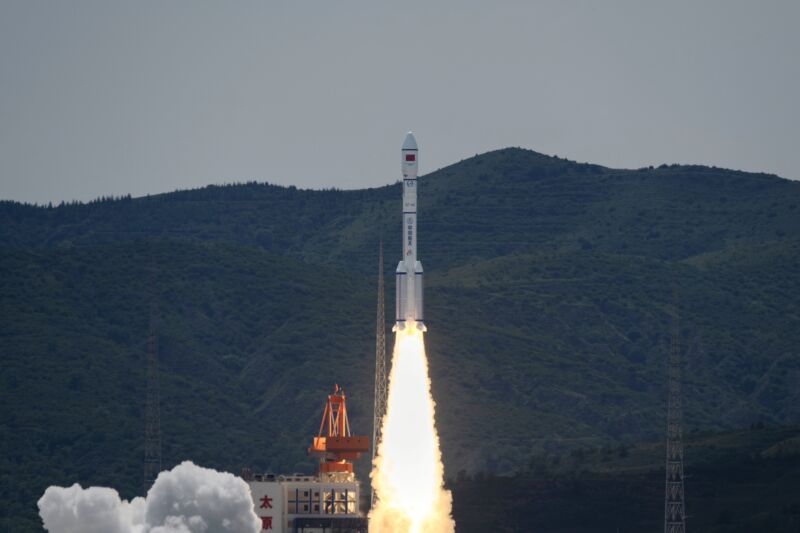
Enlarge / A Long March 6A rocket launches the first 18 Internet satellites for China's Qianfan, or Thousand Sails, broadband network. (credit: VCG via Getty Images)
Chinese officials have long signaled their interest in deploying a satellite network, or maybe several, to beam broadband Internet signals across China and other nations within its sphere of influence.
Two serious efforts are underway in China to develop a rival to SpaceX's Starlink network, which the Chinese government has banned in its territory. The first batch of 18 satellites for one of those Chinese networks launched into low-Earth orbit Tuesday.
A Long March 6A rocket delivered the 18 spacecraft into a polar orbit following liftoff at 2:42 am EDT (06:42 UTC) from the Taiyuan launch base in northern China's Shanxi province. The Long March 6A is one of China's newest rockets—and the country's first to employ strap-on solid rocket boosters—with the ability to deploy a payload of up to 4.5 metric tons (9,900 pounds) into a 700-kilometer (435-mile) Sun-synchronous orbit.
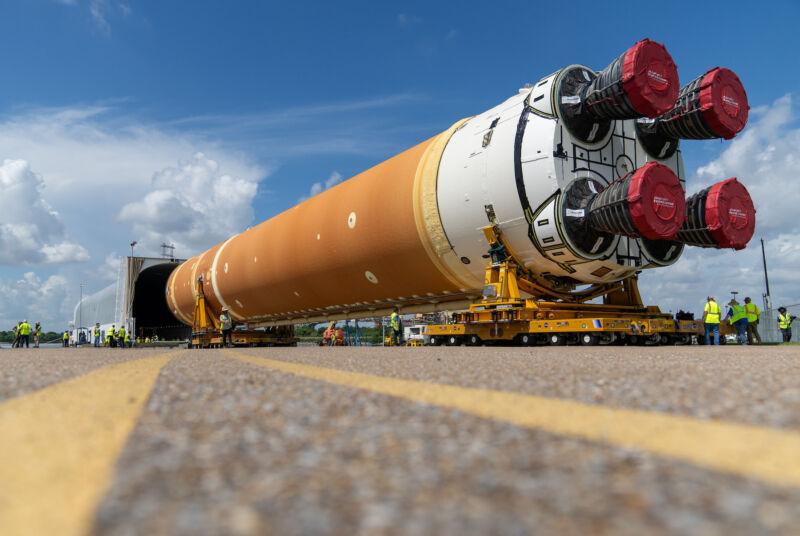
Enlarge / The core stage for NASA's second Space Launch System rocket rolls aboard a barge that will take it from New Orleans to Kennedy Space Center in Florida. (credit: NASA)
Welcome to Edition 7.03 of the Rocket Report! One week ago, SpaceX suffered a rare failure of its workhorse Falcon 9 rocket. In fact, it was the first time the latest version of the Falcon 9, known as the Block 5, has ever failed on its prime mission after nearly 300 launches. The world's launch pads have been silent since the grounding of the Falcon 9 fleet after last week's failure. This isn't surprising, but it's noteworthy. After all, the Falcon 9 has flown more this year than all of the world's other rockets combined and is fundamental to much of what the world does in space.
As always, we welcome reader submissions. If you don't want to miss an issue, please subscribe using the box below (the form will not appear on AMP-enabled versions of the site). Each report will include information on small-, medium-, and heavy-lift rockets as well as a quick look ahead at the next three launches on the calendar.

Astra finally goes private, again. A long-simmering deal for Astra's founders to take the company private has been finalized, the company announced Thursday, capping the rocket launch company’s descent from blank-check darling to delisting in three years, Bloomberg reports. The launch company's valuation peaked at $3.9 billion in 2021, the year it went public, and was worth about $12.2 million at the end of March, according to data compiled by Bloomberg. Astra's chief executive officer, Chris Kemp, and chief technology officer, Adam London, founded the company in 2016 with the goal of essentially commoditizing launch services for small satellites. But Astra's rockets failed to deliver and fell short of orbit five times in seven tries.
Lawyers for Guo Wengui—the exiled Chinese mogul on trial in New York for allegedly stealing hundreds of millions of dollars from investors in business ventures he launched—rested their case this week with a seeming non-sequitur.
The defense’s last witness was George Higginbotham, a former Justice Department lawyer who pleaded guilty in 2018 to conspiracy to make false statements to a bank. Higginbotham did that as part of an illegal lobbying conspiracy that included efforts to pressure the Trump administration to extradite Guo to China, where the mogul faces various criminal charges, including fraud, bribery and rape.
Higginbotham testified that he and his conspirators—including Elliott Broidy, a former top fundraiser for Donald Trump, and Pras Michel, a former member of the Fugees for whom Higginbotham was moonlighting as a lawyer—received around $100 million for their illicit influence efforts and said that he once met with the Chinese ambassador about Guo in an effort to advance the scheme.
But Higginbotham did not say a word about the extensive fraud case that prosecutors have laid out against Guo. That case includes videos in which Guo falsely guaranteed fans that he would not allow them to lose money investing in his business activities, bank statements and testimony from cooperating witnesses indicating that Guo moved investor funds into accounts he controlled, and various evidence that Guo then used the funds to buy stuff like a $26 million mansion, a $4.4 million Bugatti, and two $36,000 mattresses.
Higginbotham, who knew nothing about that case, could offer no information related to the charges Guo faces. His appearance highlights a strategy by Guo’s lawyers to instead play up their client’s self-styled image as a critic of the Chinese Communist Party, and to point out that Chinese agents have made extensive efforts to silence him.
During the trial, Guo’s lawyers have missed no chance to brandish a stipulation they reached with prosecutors, which says that “in 2017, a US law enforcement agency assessed that Mr. Miles Guo was the highest priority of China repatriation efforts” aimed at CCP critics within the Chinese diaspora.
Guo lawyer Sidhardha Kamaraju cited the stipulation repeatedly during the first portion of his summation on Wednesday. Kamaraju argued that CCP targeting of Guo and the scheme Higginbotham took part in gave Guo “reason to believe that the CCP could influence DOJ employees.”
Last week, the defense elicited testimony from Paul Doran, a corporate risk adviser who testified as an expert on China. Doran said that Guo, in broadcasts in 2017, had “exposed corruption at the highest levels in China, which is extremely embarrassing for President Xi [Jinping] and his close circle.”
“In my professional opinion, Mr. Guo is public enemy number one in China,” Doran said.
This focus on the Chinese government’s dislike of Guo is, arguably, responsive to the prosecution’s contention that the anti-CCP movement Guo built with former Trump adviser Steve Bannon was effectively a con—a means of winning the trust of CCP-hating Chinese emigres in order to fleece them. One of Guo’s lawyers, Sabrina Shroff, has also suggested that Chinese hacking efforts explain why Guo created numerous bank accounts. Prosecutors say it was for money laundering.
Another reason to highlight China’s beef with Guo may be to hint at a claim that Guo’s supporters have made since his arrest last year: that the Justice Department’s prosecution of Guo is itself the result of nefarious Chinese influence efforts.
Judge Analisa Torres has barred Guo’s team from making this argument in court, ruling that the theory is unsubstantiated and prejudicial. And though Higginbotham’s illegal lobbying had nothing do with his DOJ day job—he was in fact fired as result of his moonlighting—prosecutors and Torres have accused the defense of hoping that Higginbotham’s onetime employment at the department now prosecuting Guo will confuse jurors.
“Clearly bringing that up is merely a rather clumsy way of trying to link the prosecution in this case with corruption and the Chinese government,” Torres said during a sidebar with attorneys on Monday.
Guo’s lawyers did call witnesses aimed at undermining aspects of the government’s case. And Kamaraju argued in detail Wednesday that prosecutors have not proved Guo committed fraud. But much of the defense’s focus has been on asserting that Guo’s attacks on the CCP were sincere. Shroff, in the defense’s opening statement, called this campaign “the essence of [Guo’s] entire being.” That assertion tracks the biography Guo has promoted since 2017 and may have pleased the scores of his supporters who packed the Manhattan courtroom throughout the trial.
The problem, though, is that Guo’s beef with the CCP, the centerpiece of his defense, is not necessarily exculpatory. Guo could be a real target of Chinese spies while also being a fraud. Guo’s lawyers might lack better options, but they are left banking on the hope that at least some jurors find the freedom-fighter story they are selling so appealing—and perhaps so confusing—that they overlook the mountain of the evidence against Guo.
Federal prosecutors, who are presumably eager to keep their sprawling RICO case as simple as possible, have regularly responded to defense efforts to position Guo as an uncompromising CCP critic by returning jurors’ focus to his alleged crimes.
As a result, the defense, for much of the seven-week trial, has had fairly free reign to present a simplified, and highly dubious, version of their client as a lifelong dissident. Jurors, all of whom attested they knew nothing about Guo’s case before the trial, remain presumably unaware of years of robust questioning of “whether Guo is, in fact, a dissident or a double agent,” as federal Judge Lewis Liman—presiding over a lawsuit in the same courthouse as Guo’s current trial— put it in a 2021. At the time, Liman concluded that the “evidence at trial does not permit the Court to” resolve that question and that “others will have to determine who the true Guo is.”
Last year, prosecutors filed a heavily redacted motion revealing that federal agents in 2019 executed search warrants against Guo that resulted in the seizure of “more than 100 electronic devices and documents” from a safe in one of his homes. That search was not related to the fraud case for which Guo is currently on trial, the filing said. And according to a former lawyer for a Guo codefendant, it was carried out by “counterintelligence agents from the FBI”—an indication that the feds may have suspected Guo of ties to foreign espionage. But prosecutors have not mentioned that raid in open court. Nor have they pointed to lawsuits alleging Guo is CCP agent, a charge Guo denies.
But as the defense made their case over the last few weeks, prosecutors have gone further than they had before in noting that the truth is more complicated than Guo’s attorneys suggest, and have even highlighted some of the evidence of Guo’s ties to Chinese intelligence.
On Tuesday, Guo’s lawyers used Higginbotham’s testimony to introduce transcripts from 2017 phone calls in which Liu Yanping, a top official in China’s ministry of security, appeared to threaten to arrest Guo’s family members in China in a effort silence Guo’s attacks on the CCP, or convince him to return to China.
But the calls also included discussion of an “agreement” between Guo and Liu in which Guo promised to would limit his criticisms to certain CCP officials, notably excluding Xi. On cross examination, Assistant US Attorney Juliana Murray pointed to a portion of one of those calls in which Guo said he “just wanted to protect my money, my life, and my wealth.” He added that “I still love the country and the party.”
Guo has said these statements were coerced. Still, about three months later, he sent a letter to Communist Party leaders in which he offered to “desist from revealing information” if they dropped efforts to extradite him and unfroze his assets. “I will definitely devote my life to…uphold[ing] the core beliefs of Chairman Xi, and sacrifice my everything for Chairman Xi,” Guo wrote.
Earlier in the trial, on June 3, Assistant US Attorney Ryan Finkel also brought up Guo’s past ties to another senior Security Ministry official, named Ma Jian. Ma’s influence, as Mother Jones and others have reported, appears to have helped Guo make a fortune in Chinese real estate.
In his summation, Kamaraju suggested that Guo fled from China in 2014 due to his criticism of the CCP. That’s not true. Guo fled China due Ma’s 2014 arrest on allegations that included accepting bribes from Guo. (Guo has denied bribing Ma and all other charges he faces in China.)
But Guo’s ties to Ma suggest Guo may have actually been a beneficiary of the corrupt security apparatus he later faulted, part of a faction that lost out in an internal CCP power struggle. Finkel hit that point while questioning Doran.
“To be a billionaire in China requires some connections or help from the CCP, right?” Finkel asked Doran, the defense’s China’s expert. Doran agreed.
“You know Miles Guo lent money to Ma Jian’s sister, right?” Finkel asked Doran. “Ma Jian’s sister then spent that money to buy properties…Then Guo bought back those properties from Ma Jian’s sister. Did you know that? And this was designed so Ma Jian can make a profit.”
Doran said he knew none of that.
Finkel also used Doran’s presence on the stand to ask about a notable item FBI agents found during a search of Guo’s home last year: a box with the logo of the People’s Liberation Army, the Chinese military, on it. The defense had previously introduced a photo of Lieutenant General Bi Yi, head of the PLA branch purportedly responsible for cyber spying—part of their effort to highlight China’s targeting of Guo.
Finkel showed the jury a picture of the logo on the box from Guo’s home alongside a picture of the logo on Bi’s hat. They matched.
Shortly after this, though, the government returned to their main argument. Doran had testified that he was targeted by Chinese agents while living in China. Noting this, Finkel asked the witness if he “ever raised money by making false promises online” or “committed fraud.” Doran said he had not.
“Being targeted by the CCP doesn’t give you license to do those things, does it?” the prosecutor asked.
“No,” Doran said.
Lawyers for Guo Wengui—the exiled Chinese mogul on trial in New York for allegedly stealing hundreds of millions of dollars from investors in business ventures he launched—rested their case this week with a seeming non-sequitur.
The defense’s last witness was George Higginbotham, a former Justice Department lawyer who pleaded guilty in 2018 to conspiracy to make false statements to a bank. Higginbotham did that as part of an illegal lobbying conspiracy that included efforts to pressure the Trump administration to extradite Guo to China, where the mogul faces various criminal charges, including fraud, bribery and rape.
Higginbotham testified that he and his conspirators—including Elliott Broidy, a former top fundraiser for Donald Trump, and Pras Michel, a former member of the Fugees for whom Higginbotham was moonlighting as a lawyer—received around $100 million for their illicit influence efforts and said that he once met with the Chinese ambassador about Guo in an effort to advance the scheme.
But Higginbotham did not say a word about the extensive fraud case that prosecutors have laid out against Guo. That case includes videos in which Guo falsely guaranteed fans that he would not allow them to lose money investing in his business activities, bank statements and testimony from cooperating witnesses indicating that Guo moved investor funds into accounts he controlled, and various evidence that Guo then used the funds to buy stuff like a $26 million mansion, a $4.4 million Bugatti, and two $36,000 mattresses.
Higginbotham, who knew nothing about that case, could offer no information related to the charges Guo faces. His appearance highlights a strategy by Guo’s lawyers to instead play up their client’s self-styled image as a critic of the Chinese Communist Party, and to point out that Chinese agents have made extensive efforts to silence him.
During the trial, Guo’s lawyers have missed no chance to brandish a stipulation they reached with prosecutors, which says that “in 2017, a US law enforcement agency assessed that Mr. Miles Guo was the highest priority of China repatriation efforts” aimed at CCP critics within the Chinese diaspora.
Guo lawyer Sidhardha Kamaraju cited the stipulation repeatedly during the first portion of his summation on Wednesday. Kamaraju argued that CCP targeting of Guo and the scheme Higginbotham took part in gave Guo “reason to believe that the CCP could influence DOJ employees.”
Last week, the defense elicited testimony from Paul Doran, a corporate risk adviser who testified as an expert on China. Doran said that Guo, in broadcasts in 2017, had “exposed corruption at the highest levels in China, which is extremely embarrassing for President Xi [Jinping] and his close circle.”
“In my professional opinion, Mr. Guo is public enemy number one in China,” Doran said.
This focus on the Chinese government’s dislike of Guo is, arguably, responsive to the prosecution’s contention that the anti-CCP movement Guo built with former Trump adviser Steve Bannon was effectively a con—a means of winning the trust of CCP-hating Chinese emigres in order to fleece them. One of Guo’s lawyers, Sabrina Shroff, has also suggested that Chinese hacking efforts explain why Guo created numerous bank accounts. Prosecutors say it was for money laundering.
Another reason to highlight China’s beef with Guo may be to hint at a claim that Guo’s supporters have made since his arrest last year: that the Justice Department’s prosecution of Guo is itself the result of nefarious Chinese influence efforts.
Judge Analisa Torres has barred Guo’s team from making this argument in court, ruling that the theory is unsubstantiated and prejudicial. And though Higginbotham’s illegal lobbying had nothing do with his DOJ day job—he was in fact fired as result of his moonlighting—prosecutors and Torres have accused the defense of hoping that Higginbotham’s onetime employment at the department now prosecuting Guo will confuse jurors.
“Clearly bringing that up is merely a rather clumsy way of trying to link the prosecution in this case with corruption and the Chinese government,” Torres said during a sidebar with attorneys on Monday.
Guo’s lawyers did call witnesses aimed at undermining aspects of the government’s case. And Kamaraju argued in detail Wednesday that prosecutors have not proved Guo committed fraud. But much of the defense’s focus has been on asserting that Guo’s attacks on the CCP were sincere. Shroff, in the defense’s opening statement, called this campaign “the essence of [Guo’s] entire being.” That assertion tracks the biography Guo has promoted since 2017 and may have pleased the scores of his supporters who packed the Manhattan courtroom throughout the trial.
The problem, though, is that Guo’s beef with the CCP, the centerpiece of his defense, is not necessarily exculpatory. Guo could be a real target of Chinese spies while also being a fraud. Guo’s lawyers might lack better options, but they are left banking on the hope that at least some jurors find the freedom-fighter story they are selling so appealing—and perhaps so confusing—that they overlook the mountain of the evidence against Guo.
Federal prosecutors, who are presumably eager to keep their sprawling RICO case as simple as possible, have regularly responded to defense efforts to position Guo as an uncompromising CCP critic by returning jurors’ focus to his alleged crimes.
As a result, the defense, for much of the seven-week trial, has had fairly free reign to present a simplified, and highly dubious, version of their client as a lifelong dissident. Jurors, all of whom attested they knew nothing about Guo’s case before the trial, remain presumably unaware of years of robust questioning of “whether Guo is, in fact, a dissident or a double agent,” as federal Judge Lewis Liman—presiding over a lawsuit in the same courthouse as Guo’s current trial— put it in a 2021. At the time, Liman concluded that the “evidence at trial does not permit the Court to” resolve that question and that “others will have to determine who the true Guo is.”
Last year, prosecutors filed a heavily redacted motion revealing that federal agents in 2019 executed search warrants against Guo that resulted in the seizure of “more than 100 electronic devices and documents” from a safe in one of his homes. That search was not related to the fraud case for which Guo is currently on trial, the filing said. And according to a former lawyer for a Guo codefendant, it was carried out by “counterintelligence agents from the FBI”—an indication that the feds may have suspected Guo of ties to foreign espionage. But prosecutors have not mentioned that raid in open court. Nor have they pointed to lawsuits alleging Guo is CCP agent, an allegation Guo denies.
But as the defense made their case over the last few weeks, prosecutors have gone further than they had before in noting that the truth is more complicated than Guo’s attorneys suggest, and have even highlighted some of the evidence of Guo’s ties to Chinese intelligence.
On Tuesday, Guo’s lawyers used Higginbotham’s testimony to introduce transcripts from 2017 phone calls in which Liu Yanping, a top official in China’s ministry of security, appeared to threaten to arrest Guo’s family members in China in a effort silence Guo’s attacks on the CCP, or convince him to return to China.
But the calls also included discussion of an “agreement” between Guo and Liu in which Guo promised to would limit his criticisms to certain CCP officials, notably excluding Xi. On cross examination, Assistant US Attorney Juliana Murray pointed to a portion of one of those calls in which Guo said he “just wanted to protect my money, my life, and my wealth.” He added that “I still love the country and the party.”
Guo has said these statements were coerced. Still, about three months later, he sent a letter to Communist Party leaders in which he offered to “desist from revealing information” if they dropped efforts to extradite him and unfroze his assets. “I will definitely devote my life to…uphold[ing] the core beliefs of Chairman Xi, and sacrifice my everything for Chairman Xi,” Guo wrote.
Earlier in the trial, on June 3, Assistant US Attorney Ryan Finkel also brought up Guo’s past ties to another senior Security Ministry official, named Ma Jian. Ma’s influence, as Mother Jones and others have reported, appears to have helped Guo make a fortune in Chinese real estate.
In his summation, Kamaraju suggested that Guo fled China in 2014 due to his criticism of the CCP. That’s not true. Guo fled China due Ma’s 2014 arrest on allegations that included accepting bribes from Guo. (Guo has denied bribing Ma and all other charges he faces in China.)
But Guo’s ties to Ma suggest Guo may have actually been a beneficiary of the corrupt security apparatus he later faulted, part of a faction that lost out in an internal CCP power struggle. Finkel hit that point while questioning Doran.
“To be a billionaire in China requires some connections or help from the CCP, right?” Finkel asked Doran, the defense’s China’s expert. Doran agreed.
“You know Miles Guo lent money to Ma Jian’s sister, right?” Finkel asked Doran. “Ma Jian’s sister then spent that money to buy properties…Then Guo bought back those properties from Ma Jian’s sister. Did you know that? And this was designed so Ma Jian can make a profit.”
Doran said he knew none of that.
Finkel also used Doran’s presence on the stand to ask about a notable item FBI agents found during a search of Guo’s home last year: a box with the logo of the People’s Liberation Army, the Chinese military, on it. The defense had previously introduced a photo of Lieutenant General Bi Yi, head of the PLA branch purportedly responsible for cyber spying—part of their effort to highlight China’s targeting of Guo.
Finkel showed the jury a picture of the logo on the box from Guo’s home alongside a picture of the logo on Bi’s hat. They matched.
Shortly after this, though, the government returned to their main argument. Doran had testified that he was targeted by Chinese agents while living in China. Noting this, Finkel asked the witness if he “ever raised money by making false promises online” or “committed fraud.” Doran said he had not.
“Being targeted by the CCP doesn’t give you license to do those things, does it?” the prosecutor asked.
“No,” Doran said.
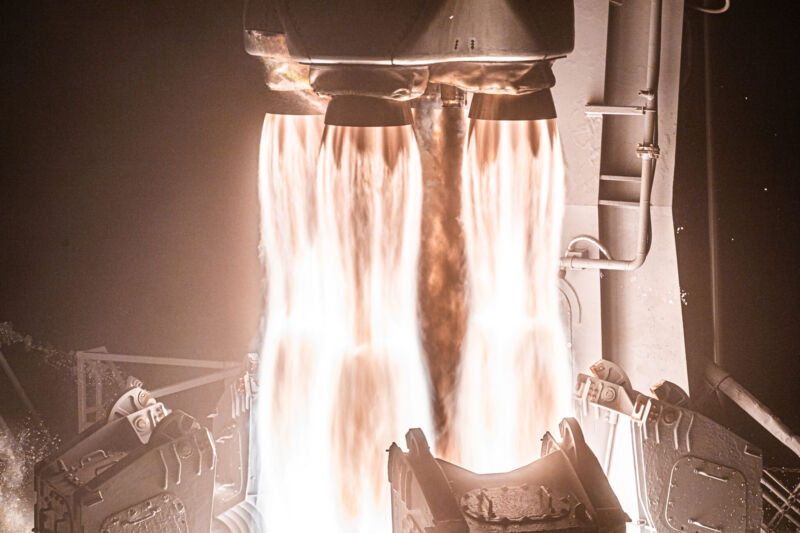
Enlarge / Four kerosene-fueled Reaver engines power Firefly's Alpha rocket off the pad at Vandenberg Space Force Base, California. (credit: Firefly Aerospace)
Welcome to Edition 7.01 of the Rocket Report! We're compiling this week's report a day later than usual due to the Independence Day holiday. Ars is beginning its seventh year publishing this weekly roundup of rocket news, and there's a lot of it this week despite the holiday here in the United States. Worldwide, there were 122 launches that flew into Earth orbit or beyond in the first half of 2024, up from 91 in the same period last year.
As always, we welcome reader submissions, and if you don't want to miss an issue, please subscribe using the box below (the form will not appear on AMP-enabled versions of the site). Each report will include information on small-, medium-, and heavy-lift rockets as well as a quick look ahead at the next three launches on the calendar.

Firefly launches its fifth Alpha flight. Firefly Aerospace placed eight CubeSats into orbit on a mission funded by NASA on the first flight of the company’s Alpha rocket since an upper stage malfunction more than half a year ago, Space News reports. The two-stage Alpha rocket lifted off from Vandenberg Space Force Base in California late Wednesday, two days after an issue with ground equipment aborted liftoff just before engine ignition. The eight CubeSats come from NASA centers and universities for a range of educational, research, and technology demonstration missions. This was the fifth flight of Firefly's Alpha rocket, capable of placing about a metric ton of payload into low-Earth orbit.
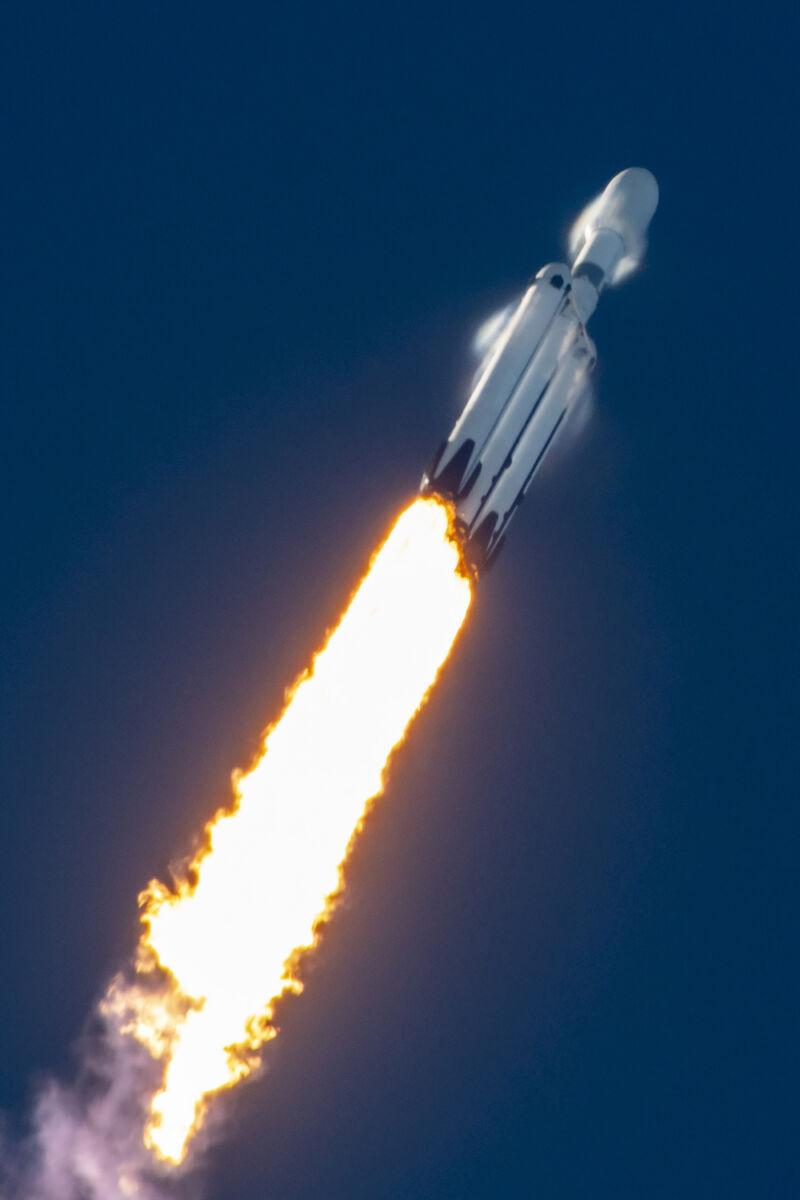
Enlarge / SpaceX's 10th Falcon Heavy rocket climbs into orbit with a new US government weather satellite. (credit: SpaceX)
Welcome to Edition 6.50 of the Rocket Report! SpaceX launched its 10th Falcon Heavy rocket this week with the GOES-U weather satellite for NOAA, and this one was a beauty. The late afternoon timing of the launch and atmospheric conditions made for great photography. Falcon Heavy has become a trusted rocket for the US government, and its next flight in October will deploy NASA's Europa Clipper spacecraft on the way to explore one of Jupiter's enigmatic icy moons.
As always, we welcome reader submissions, and if you don't want to miss an issue, please subscribe using the box below (the form will not appear on AMP-enabled versions of the site). Each report will include information on small-, medium-, and heavy-lift rockets as well as a quick look ahead at the next three launches on the calendar.

Sir Peter Beck dishes on launch business. Ars spoke with the recently knighted Peter Beck, founder and CEO of Rocket Lab, on where his scrappy company fits in a global launch marketplace dominated by SpaceX. Rocket Lab racked up the third-most number of orbital launches by any US launch company (it's headquartered in California but primarily assembles and launches rockets in New Zealand). SpaceX's rideshare launch business with the Falcon 9 rocket is putting immense pressure on small launch companies like Rocket Lab. However, Beck argues his Electron rocket is a bespoke solution for customers desiring to put their satellite in a specific place at a specific time, a luxury they can't count on with a SpaceX rideshare.
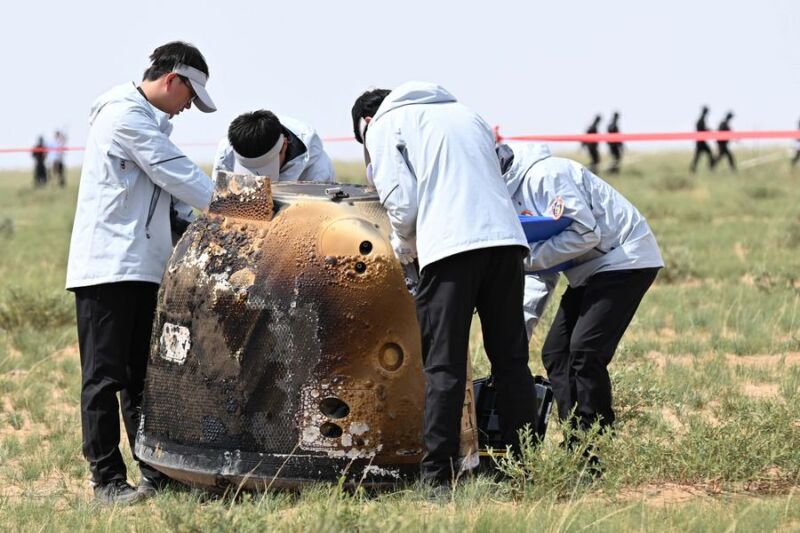
Enlarge / This photo taken on June 25, 2024, shows the retrieval site of the return capsule of the Chang'e-6 probe in Siziwang Banner, north China's Inner Mongolia Autonomous Region. (credit: Xinhua/Lian Zhen)
A small spacecraft landed in Inner Mongolia on Tuesday, bringing samples from the far side of the Moon back to Earth.
This was not China's first robotic mission to return a few pounds of dust and pebbles from the lunar surface—that came with the Chang'e 5 mission in December 2020. However, this was the first time any space program in the world returned material from the Moon's far side.
The successful conclusion of this mission, which launched from Earth nearly two months ago, marked another significant achievement for China's space program as the country sets its sights on landing humans on the Moon by the year 2030.
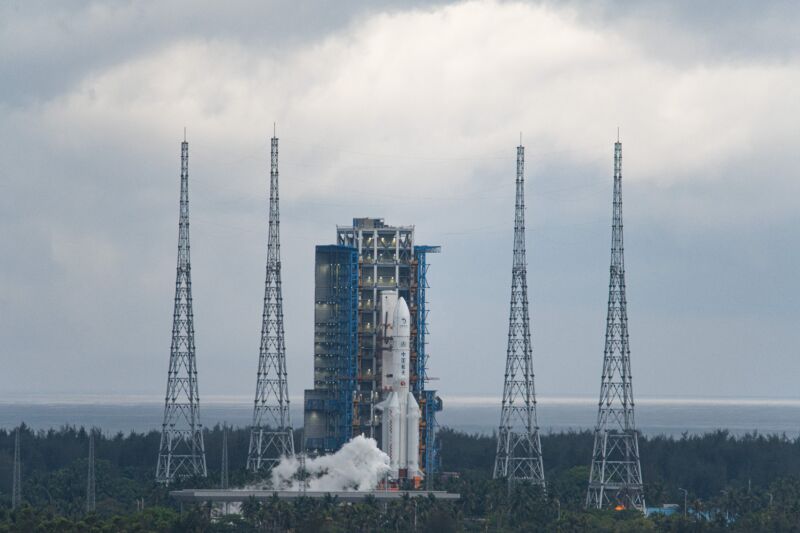
Enlarge / A Long March 5 rocket carrying the Chang'e 6 lunar probe blasts off from the Wenchang Space Launch Center on May 3, 2024, in Wenchang, China. (credit: Li Zhenzhou/VCG via Getty Images)
China landed a spacecraft on the Moon this weekend for the fourth time, successfully placing its Chang’e 6 lander in the South Pole-Aitken Basin on the far side of the Moon.
After the landing on Saturday evening (United States time), the autonomous spacecraft will spend about 48 hours collecting samples. It will do so by two different means, drilling to collect material from beneath the ground, as well as using a robotic arm to gather regolith from the surface.
Then a part of the spacecraft is due to blast off from the surface of the Moon—likely on Monday evening, US time—before making a return flight to China. If successful, this would be the first time samples have been returned to Earth from the far side of the Moon.